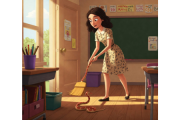Not far from our house was a children’s playground, kept in good condition by its groundskeeper, who locked it up promptly at 6 pm. A posted sign informed parents that only children under the age of 12 were permitted to use the park. As I was now 11, I resented the imminent exclusion, as I had always played with my younger brothers, and the park’s imaginative layout exerted a fascination on all three of us. I was reading at the time a series of English stories borrowed from the school library, both fictional and biographical, in which boys are sent from colonial outposts to boarding school in England, where they encounter bullying, bad food, a cold climate, and homesickness, and I feared that such uprootedness, familiar to Canadian survivors of residential schools, would be mine if I were sent to such a school at 13, when my elementary education would be completed. I kept these anxieties to myself, as my father never encouraged the weakness, as he saw it, of emotional disclosure, and I had no-one else to confide in. Such worry ultimately proved groundless, however, for events for our family were to take a different course, as will be seen shortly.
I enjoyed many aspects of school in Caracas. I noticed the girls more. To my shame I continued to do poorly in math; in fact, my performance became worse and worse to the point where my father lost patience with my lack of application in the subject, but I read voraciously, did well in English composition, spelling, word study, and general knowledge, and enjoyed history, and our music class, where a gifted teacher encouraged the singing of folk songs from many countries, a means of providing incidental insight into the cultures from which they sprang: The Vicar of Bray, about a priest whose principles were as changeable as the wind, Scarborough Fair, Ilkley Moor, Men of Harlech, Loch Lomond, Flow Gently Sweet Afton, Drink to Me Only with Thine Eyes, Waltzing Matilda, Alouette, The Star-Spangled Banner, Shenandoah, The Battle Hymn of the Republic, John Peel, Pastores a Belem (a Christmas carol in Spanish), and the Venezuelan national anthem, to cite but a few. We were taught Latin, and French, and took Spanish from a firebrand revolutionary who taught relentlessly about the iniquities Spanish conquistadores inflicted on indigenous tribes in Venezuela. She was dismissed after she unwisely yelled ‘Viva Fidel!’ at the conclusion of an obscure harangue she had delivered the day before to the perplexity of her audience at an open-air school concert, about ‘correct’ pronunciation in Spanish, which had no relevance to the concert whatsoever.
While this behavior was absurd, if not ultimately comical, we appreciated Venezuelan humour. Plaza Venezuela used to have a fountain surrounded by a number of reclining naked statues. As they were all facing the fountain itself with their buttocks to the circulating traffic, some called this monument La Plaza de Las Petas (Place of the Farts). The statues have since been removed. A person who changes his nationality is called a reencauchado or ‘re-tread’: same old tire deep down, the surface newness mere camouflage. Their jokes today, sadly, are wryly ironic, about economic and financial mismanagement of the current socialist government.




